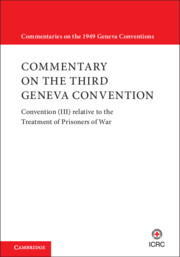 Commentary on the Third Geneva Convention
Commentary on the Third Geneva Convention Book contents
- Commentary on the Third Geneva Convention
- International Committee of the Red Cross
- Copyright page
- Contents
- Foreword by Peter Maurer
- Acknowledgements
- Abbreviations
- Introduction
- Preamble
- Part I General Provisions
- Part II General Protection of Prisoners of War
- Part III Captivity
- Part IV Termination of Captivity
- Part V Information Bureaux and Relief Societies for Prisoners of War
- Part VI Execution of the Convention
- Book part
- Sources
- Index
- References
Article 103 - Judicial Investigations and Confinement Awaiting Trial
from III - Judicial Proceedings
Published online by Cambridge University Press: 21 August 2021
- Commentary on the Third Geneva Convention
- International Committee of the Red Cross
- Copyright page
- Contents
- Foreword by Peter Maurer
- Acknowledgements
- Abbreviations
- Introduction
- Preamble
- Part I General Provisions
- Part II General Protection of Prisoners of War
- Part III Captivity
- Part IV Termination of Captivity
- Part V Information Bureaux and Relief Societies for Prisoners of War
- Part VI Execution of the Convention
- Book part
- Sources
- Index
- References
Summary
Article 103 can be said to contain pretrial guarantees forprisoners of war who are suspected or accused of criminal offences.It addresses two pretrial situations: judicial investigations andconfinement awaiting trial. Both terms require some clarification.First, the term ‘judicial investigation’ may suit civil-lawjurisdictions better than common-law jurisdictions. This is because,in civil-law systems, a suspect may be charged at an early stage,with a subsequent, formal, judge-led investigation prior to thosecharges proceeding to trial. In common-law or adversarial legalsystems, investigations are typically led by law enforcement(police) authorities, rather than judges, and involve only minimalor occasional judicial supervision. Furthermore, in common-lawsystems, charges are preferred towards the end of an investigationprocess, rather than at the beginning. The reference in Article 103to ‘judicial investigations’ should not be taken to imply that it isonly relevant in civil-law systems. The thrust of the provision,which must be applied whatever the legal system, is thatinvestigations concerning persons suspected or accused of criminaloffences must be conducted expeditiously, to allow trial to takeplace as soon as possible. Second, Article 103 employs the term‘confinement awaiting trial’. While a variety of terms is used todescribe this phenomenon, including ‘pretrial detention’, ‘detentionon remand’ and ‘provisional detention’, this commentary will limititself to the terms ‘confinement awaiting trial’ and ‘pretrialconfinement’.
- Type
- Chapter
- Information
- Commentary on the Third Geneva ConventionConvention (III) relative to the Treatment of Prisoners of War, pp. 1467 - 1479Publisher: Cambridge University PressPrint publication year: 2021
